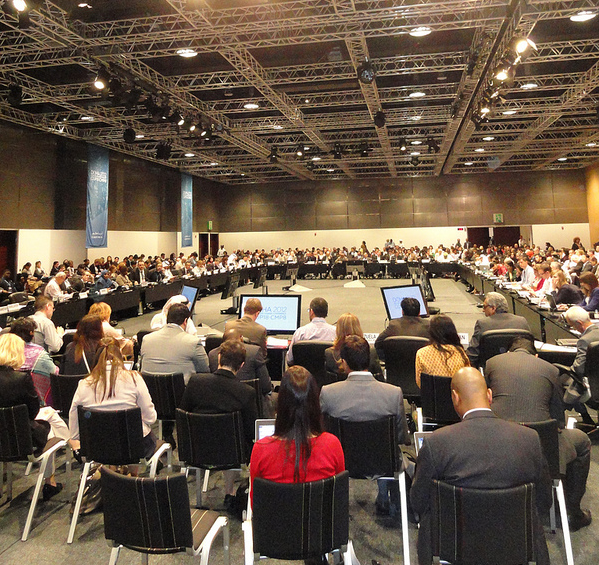Unresolved issues still “homeless” as fireworks fly at LCA session on the first day of week two
Week 2 of COP18 has started. Ministers have started arriving, high level ministerial meetings will soon commence. Perhaps in a trailer of what is to come later this week, especially in the Kyoto Protocol and LCA tracks, the LCA session opened amongst great disagreement between parties.
Last week at the Opening plenary, the Chair’s text had found great support amongst most developing countries and disapproval from the developed countries.
After the end of the last week and stock-taking, the informal paper presented by the Chair today found vehement opposition amongst all G77 countries across the board.
Bernarditas Muller of Philippines made a strong and emotionally charged statement pointing out that they are waiting to be hit by a typhoon as we speak, and may be counting bodies by Christmas. An LCA text without finance, adaptation, response measures, is not an option. She strongly criticized those who continue to refuse to make commitments. Her statements were supported by strong applause.
Claudia Salerno, fiery negotiator from Venezuela pointed out that it is not market mechanisms but adaptation that will be a breaking point. She also pointed out that the most of the world does not consider the LCA text as the basis for negotiations and the Annex 1 countries may as well make their own convention without the developing countries.
Bolivia rejected the text pointing out that there is an obsession with markets and that we seem to have forgotten that market mechanisms and offsets were created to solve the problem. The current text supports that while commitment from developing countries remain non-existent.
Nicaragua, speaking on behalf of the newly formed Like Minded Developing Countries, of which both India and China are a part, group expressed deep disappointment in the text and like many others, called for the text to be based on and address all of the elements of the Bali Action Plan.
Despite submissions from parties important texts relating to finance, adaptation, technology, capacity building had been dropped.
Developed countries, especially USA continued to treat issues raised by the developing countries with disregard. US’s major concern is closing the LCA at all cost and this is apparent from their statements at COP 18. They reiterated that it’s hard and unrealistic to finish discussion on all topics and that the LCA track must close.
(Recently, American negotiator Jonathan Pershing even commented that they can not sell the idea of equity back home, further reminding American NGOs that it’s because of the ‘institutional equity’ advocated by the US that they are present and actively participate at the COP. The irony is devoid of humor.)
India highlighted that there was unanimity across the developing world that this text was not acceptable and that the chair and developed nations should understand and note this.
The Chair has now tabled two texts both of which have encountered criticism from different blocks. It is a party driven process and it’ time for the negotiators to roll up their sleeves and thrash out an acceptable deal that everyone won’t be happy with, but can at least agree on. Something needs to give, and one hopes that the unresolved LCA issues will ‘find a new home’ (a term that has gained much popularity here in Doha) that is agreeable to all.
(Photo Courtesy - session and J.Pershing: Nathalia Clark; LCA chair: Pujarini Sen, via http://www.flickr.com/photos/adoptanegotiator/)




About the author
Pujarini Sen
Currently working as Advocacy Manager at Chintan Environmental Research and Action Group, New Delhi, an organisation working with research, policy and sustaining livelihoods around all things waste. An English graduate, first became engaged with environmental issues working on a short project with the children in the Sunderban delta area. Wants to study more, this time about climate change and related issues.






